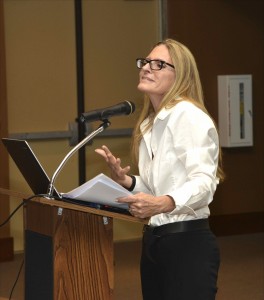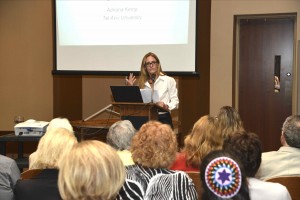Israeli Chronicles — Connecting Israel & Cincinnati

Student and Teacher Reunite with a Purpose
13 years later and thousands of miles away, connection brings immigration expertise and perspective to Cincinnati
Guest Post by Jackie Congedo
It’s every professor’s dream to see his or her students apply what they’ve learned.
And it’s every student’s dream to share his or her post-graduate work with a favorite professor.
Last week, both of those dreams came true for Israeli sociology professor, Dr. Adriana Kemp, and her former student, Maia Morag.
“She still impresses me the way she did 13 years ago, when I was an undergrad at Tel Aviv University,” Morag said of Kemp.
As Cincinnati’s community emissary from Israel, it’s Morag’s job to build meaningful connections between Cincinnati and Israel. The “Israelity” lecture series is one vehicle for that, and Morag is charged with recruiting speakers who can bring perspectives about what life is really like in Israel.
“When we were brainstorming about who to bring and which topics we should deal with, I thought that migrant workers and refugees are important topics. Not only are they relevant issues in Israel, but they also touch on the delicate nature of Israel’s character. How can Israel balance what some call a responsibility to accommodate new non-Jewish immigration and asylum-seekers, while still maintaining its identity as a Jewish state?” Morag said.
Morag immediately thought of her former professor, Dr. Kemp, who has devoted her career to research and exploration of the complicated topic. As Kemp’s scheduled visit neared, her expertise only became more relevant.
“Immigration is a hot topic wherever you go. It’s relevant in the US and in other countries,” Morag said. “We can all learn from the situation in Israel.”
Kemp’s visit was a busy one. On October 7, she met with Cincinnati area social workers, professionals, and advocates working on local refugee and immigration issues. The lunchtime roundtable discussion was hosted by the Jewish Community Relations Council, and included representatives from Catholic Charities, Su Casa Hispanic Center, the American Red Cross, Xavier University, Refugee Connect, and other organizations.

“They spoke about immigration challenges that the US and Israel have in common, and about how their perspectives are different,” Morag said. “In the end, learning more about how other countries are handling new waves of immigration helps everyone build context and reconsider their own situations.”
Kemp started her second full day in Cincinnati guest-teaching a class on modern Israel in the Judaic Studies department at the University of Cincinnati, hosted in collaboration with UC Hillel.
“The students had great questions. They were really into what she was talking about,” Morag said.
Next Dr. Rabbi Gary Zola took Kemp on a tour of the American Jewish Archives at Hebrew Union College. He took time to show Kemp some documents that she found fascinating.
“She couldn’t let go!” said Morag. “We lost her to the papers for a while.”
A lunchtime talk with student rabbis and faculty from Hebrew Union College about refugees in Israel followed, before the main event that night: Kemp’s “Israelity” lecture at Adath Israel Congregation.
Eighty-eight people attended and listened carefully as Kemp spoke about the history of non-Jewish immigration to Israel and explained the changing status of both migrant workers and refugees. She also described the influence new immigration is having on Israeli society. Lecture attendees seemed grateful for the opportunity to learn about a topic unfamiliar to many of them, and to hear about it from an expert as well versed in the subject as Kemp.

“I think she really educated people about a topic that sometimes escapes the headlines. She touched on the emotion of it all,” Morag said. “It’s a debate that is inextricably linked to Jewish character. As non-Jewish immigration continues, what kind of country does Israel want to be?”
Saying goodbye
An inaugural visit to Cincinnati wouldn’t be complete without lunch on the river, and after a meal at Moerlein Lager House, Morag and Kemp visited the National Underground Railroad Freedom Center.
“That visit was really meaningful for her since she’s dealing with topics of human trafficking. She found the exhibits fascinating,” Morag said.
As the three-day visit came to a close, both teacher and student reflected on the reunion with pride.
“It was really interesting to get to know her as a person. It only made me respect her and enjoy what she had to offer even more,” Morag said. “She’s very interesting and very open. She’s curious about people and their stories. She’s smart, and critical.”
The feeling was mutual for Kemp.
“She said, ‘What else can a professor ask for, but to meet someone so many years after and see that they’ve made a difference?’” Morag said, smiling.

